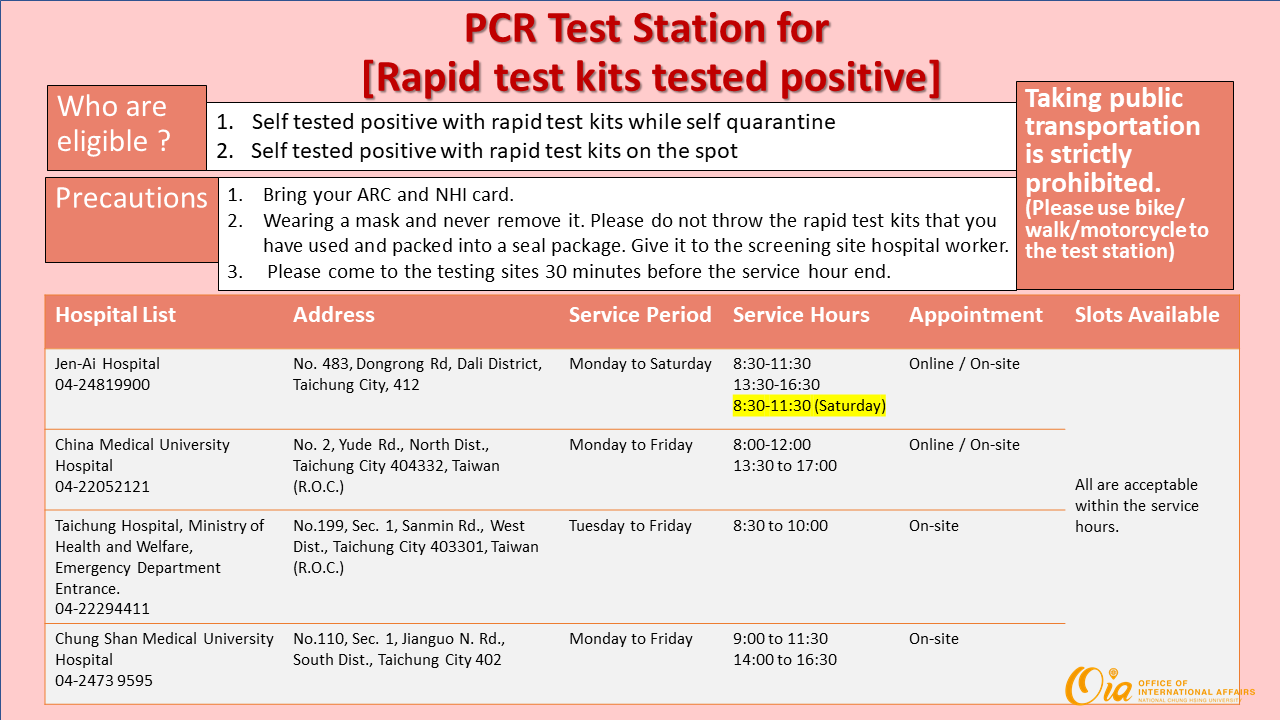【Notice No.18】FAQ Related to COVID-19
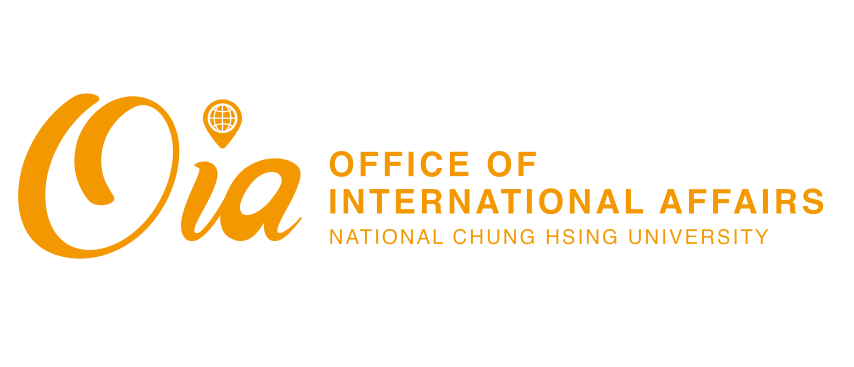
Updated on May 27, 2021
Q1. Since NCHU has implemented distance learning, I want to go back to my home country. What should I do?
A1. Please contact OIA first. Then fill out the “Travel Abroad Declaration and Application Form” and have it signed by your advisor and chairman of the department. Information of your flight (round way) and of the quarantine hotel you will stay in Taiwan is also requested. Also, make sure your ARC is valid before departure. If students leave without notifying OIA (graduates excluded), OIA will not be able to assist the student. See more information on this page.
Q2. What is the definition of close contact?
A2.
i) If you are staying together with confirmed cases. (According to CDC)
ii) If you have interaction with confirmed case with mask-off for 15 minutes and above of two days ago. (NCHU special terms)
Q3. What if I stayed together with the confirm case?
A3.
i)Please have a home isolation for three days
(Exp:4/26 diagnosed confirm (Day 0), 4/29 end of home isolation (Day 3))
ii)Go to the Health and Counseling Center to receive three rapid antigen kits with mask on
iii) Should take 3-day home-isolation and 4-day self-initiative Epidemic Prevention. You cannot enter the campus within these 7 days.
iv) You will get distribution of 3 rapid-test kits. (Following the name list)
- Who live in NCHU Dorm: distributed by dorm service center
- Who live out of the campus: distributed by Health and Counseling Center.
v)Please report your information through NCHU OSA-Trace-System.
vi)Students should apply for Covid-19 quarantine leave online and also send an e-mail to the professor/lecturer to explain the reason at the same time.
Application System:
[NCHU single sign-on > All application Entry > Student Affair Information > Student leave application(學生請假系統)]
https://idp.nchu.edu.tw/nidpidff/sso?id=4&sid=1&option=credential&sid=1&target=https%3A%2F%2Fportal.nchu.edu.tw%2Fportal
Q4. What should I do if I had a mask-off interaction for 15 minutes and above of two days ago with the confirmed case?
A4.
i) Take a 3-days epidemic prevention leave through school system
ii) Go to the Health and Counseling Center to receive a rapid antigen kit with mask on.
Q5. What should I do if I have contact with the close contact?
A5.
i) Take a rapid antigen test if suspected symptoms develop.
ii) Maintain a good self-health monitoring habit
Q6. What are the quarantine regulations of Taiwan if I am back from my country?
A6. Starting from 2022/05/09 individual who arrive to Taiwan will subject to 7 days(8 nights) of quarantine in hotel and 7 days self-health management. He/she shall only attend school afterwards.
Q7. Can I go out if I am in self-initiated epidemic prevention?
A7. Yes, you can if your rapid antigen test shows negative result. However, dining in, participate events or going any crowded places are strictly prohibited.
Q8. What is the 3+4 plan?
A8.
i ) If you did not receive three doses of vaccination and you are a close contact, please obey on this rule
ii) 3 days home isolation and 4 days self-health monitoring
Q9. What is the 0+7 plan?
A9.
i) for those who have three doses of vaccination is only eligible (Since 5/17)
ii) directly begin seven days of self-initiated epidemic prevention.
Q10. What is the difference between self-health management, self-initiated epidemic prevention and self-health monitoring?
A10.
|
Self-health management |
Self-initiated epidemic prevention |
Self-health monitoring |
|
Difference |
||
|
For those who were confirmed case or back from overseas |
For those who were close contact |
For those who were contact of close contact |
Q11. What if my rapid test tested positive?
A11.
i) Write down your name, tested date and snap a photo with your NHI card or ARC
ii) Keep your used rapid test kit in a sealed package
iii) Do not rush to the hospital for PCR test except you are having severe symptoms such as wheezing or difficulty breathing, delirium, or persistent chest pain must seek medical attention immediately.
iv) Contact South District Public Health Center of Taichung or download 健保快易通 app to check cooperate clinic and call to make appointment for telemedicine.
v) Doctor on telemedicine will give you a diagnose and monitor your condition
|
Agree on the diagnose |
Disagree on the diagnose |
|
The doctor will prescribe medicine for you and find a friend to help you and collect it. At the same time, stay calm and wait at home. |
Head to a hospital or clinic for a PCR screen test (Make a reservation first!) |
Q12. Can I pay to get a COVID-19 PCR test?
A12. Yes.
1. Applicable object and application/appointment method for emergency
(1) The person in the home (self) isolation/quarantine who needs to go out for compassionate reasons, including visiting relatives in a critical condition, attending funerals of relatives, or dealing with other urgent issues. → Please apply to the local health department or call 1922.
(2) Short-term business travelers. (according to regulations concerning short-term business travelers’ applications for shortened quarantine periods in Taiwan.) → Please apply to the local health department or call 1922.
(3) The person under the home (self) isolation/quarantine who need to go out for compassionate reasons, including visiting relatives overseas in a critical condition, attending funerals of relatives overseas, or dealing with other urgent issues, and willing to fill precaution checklist. → Please apply to the local health department or call 1922.
(4) The person under self-health management (the 15th-21st day after entry or contact). → Please make an appointment (link)
(5) The person under self-health management during the management period who needs to visit the sick in the hospital, including visiting relatives in a critical condition, attending funerals of relatives, or dealing with other urgent issues. → Please make an appointment (link)
2. Applicable object and appointment method for outpatient
(1) To enter other countries for the compassionate reasons listed above.
(2) Job requirements.
(3) To study abroad.
(4) Foreign nationals, mainland Chinese, or Hong Kong and Macao residents who will depart from Taiwan.
(5) Family members of people traveling abroad for the reasons listed above.
(6) Approved by the Central Epidemic Command Center.
(7) Other issues: the person who does not meet the above-mentioned applicable objects but has needs for out-of-pocket testing.
Please contact the designated hospitals listed in the following link to make an appointment. It costs about 5,000-7,000NTD.
The list and service hour: link
Q13. Can I get myself vaccinated?
A13. Currently, it’s not available.
Q14. How do I know if I am in contact with people that are highly possible of being infected or confirmed cases?
A14.
(1) The department of Health of your local habitat will conduct the investigation.
(2) They will collect in total 13 personal information, including your name, gender, ID number and address, and others in accordance with the level of risk.
(3) The department of Health will stay in touch with the home-quarantined individuals remotely, conducting the follow-up health tracking mechanism afterward.
Q15. What are the differences between Self-Health Management, Home Quarantine, and Self-Health Monitoring?
A15. Please refer to the following posters:
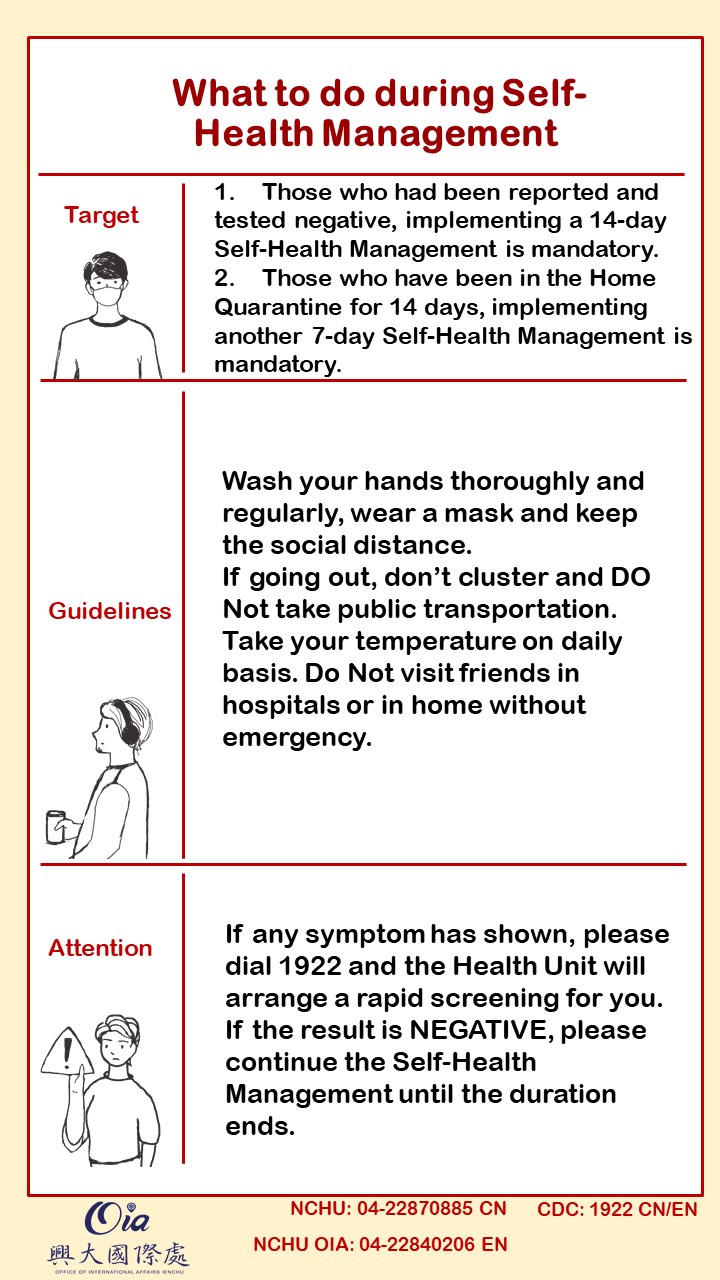
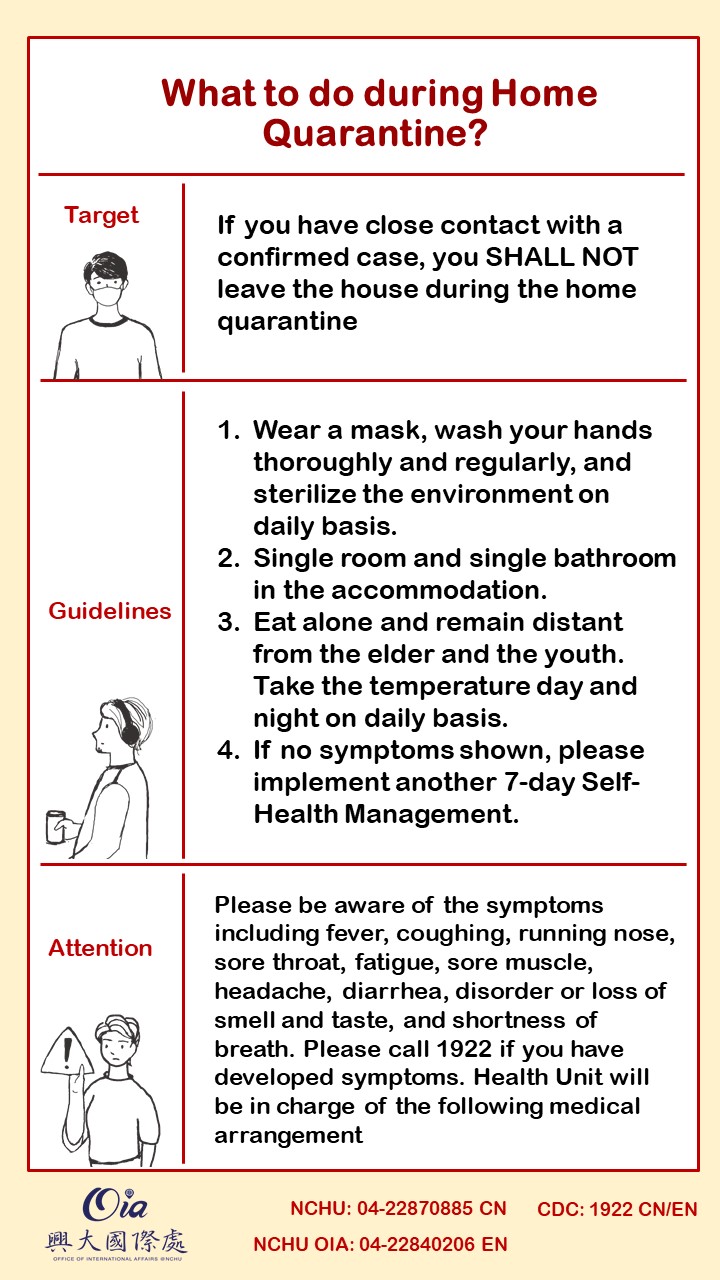
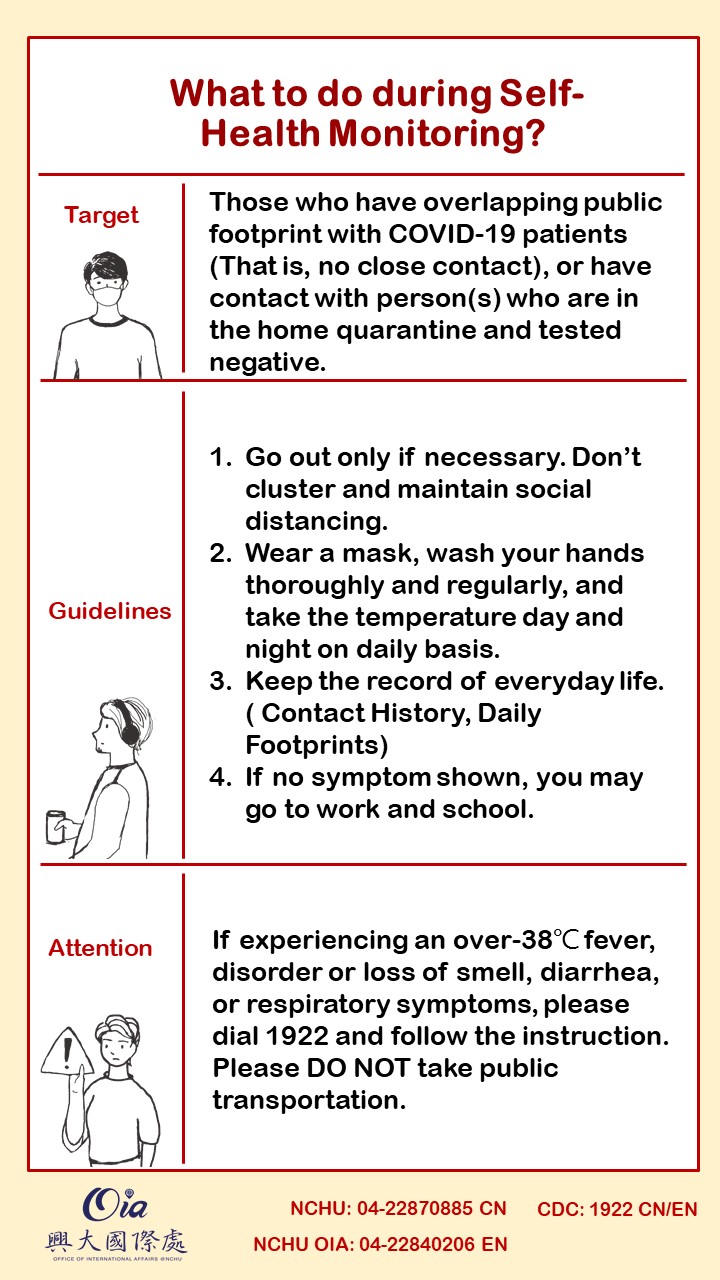
Q16. How long does it take for the vaccine to provide protection?
A16. Up to June 30th, 2021, given the low coverage of vaccination in Taiwan and the potential threat of the Delta variant of the COVID-19 virus internationally, no individual (including Foreigners or Taiwan citizens) should consider themselves completely safe after receiving vaccination and disregard personal and public health measures on a daily basis. To avoid accidental infection from the said virus, vaccinated individuals should always beware of taking proper public health measures thoroughly and regularly.
After receiving the first dose of the vaccine, do not think that the vaccine will provide complete protection within two to three days. Conservatively speaking, it will take at least two weeks to develop protection after vaccination. Therefore, it is always important to pay attention to your health conditions (e.g., body temperature, COVID-19 relevant symptoms) after vaccination. To avoid accidental infection from the virus, vaccinated individuals should beware of taking proper public health measures thoroughly and regularly.
*Important reminder: Be aware that even after vaccination, it doesn’t mean that individuals are completely under protection. Vaccinated individuals may still have the risk of acquiring the infection and possibly transmit it to others.
Q17. Is it necessary to wear a mask after vaccination?
A17. Based on the research, the COVID-19 vaccine only provides the protection to reduce the chances of severe illnesses and deaths after infection, but it does not completely get rid of secondary infection. Therefore, in order to protect the safety of public and yourself, public health measures including wearing a mask properly and constantly, washing hands thoroughly and regularly, and maintain social distancing are still strongly enforced.
Q18. Is there still a chance of spreading the disease if one had a vaccination?
A18. Base on the current research, a vaccinated individual but has a vaccine breakthrough infection has lower viral load compared to the non-vaccinated individuals. Thus, it may lower the risk of further transmission. However, it is important to note that there is no scientific evidence to prove that the vaccine can completely eliminate the chances of COVID-19 transmission from the vaccinated individuals. Especially, the chance can still be potentially possible when facing the new variant of COVID-19 virus, which is highly contagious with low viral load level.
Q19. What should I do if I feel unwell after receiving the COVID-19 vaccination?
A19. Theoretically, after 14 days of the vaccination, individuals should be able to develop immune protection and reduce the risks of severe illnesses and death. However, it cannot rule out the possibility of getting infected and further transmission of the virus to other people even after the vaccination. Therefore, if you feel uncomfortable after receiving the vaccine within 14 days or even after 2 weeks, please DO NOT enter the campus to work or to go to crowded areas. In addition, you should seek for professional advice from a doctor or medical treatments immediately. It is also important to wear a mask properly and constantly, wash hands thoroughly and regularly, and maintain social distancing. Also, please DO NOT share meals at home. Such measures can avoid further transmission of the COVID-19 virus to your family members, classmates, or colleagues.
Q20. If the students’ financial status was heavily impacted (i.e.: income cut-off, home quarantine/ isolation, receiving medical treatments) by the COVID-19 pandemic, will NCHU provide any allowance that can help students’ financial difficulties?
A20. Yes. International Students who are enrolled in NCHU and have suffered financial losses due to the COVID-19 pandemic (or his/her family). The application form can be completed by the applicant or his/her department counselor and submitted to the Office of International Affairs with relevant attachments or required documents. Please remember that the application is limited to ONE TIME ONLY.
Please click the link for more detailed information and guidance regarding the NCHU relief allowance: LINK
Q21. What are the Health Monitoring Measures for the arriving students during summer vacation upon entrance?
A21. Please click the link for more detailed information and guidance regarding the Health Monitoring Measures: LINK
Q22. What should I do if I was tested positive?
A22. Please refer to the following posters:
